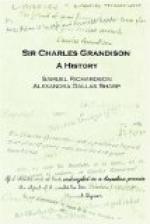Harriet Byron.
LETTER VII
Miss Byron.—In continuation
Sunday night, April 2.
Dr. Bartlett has received from Sir Charles an account of what passed last Friday between him and Sir Harry and Lady Beauchamp. By the doctor’s allowance, I enclose it to you.
In this letter, Lucy, you will see him in a new light; and as a man whom there is no resisting, when he resolves to carry a point. But it absolutely convinces me, of what indeed I before suspected, that he has not an high opinion of our sex in general: and this I will put down as a blot in his character. He treats us, in Lady Beauchamp, as perverse humoursome babies, loving power, yet not knowing how to use it. See him so delicate in his behaviour and address to Miss Mansfield, and carry in your thoughts his gaiety and adroit management to Lady Beauchamp, as in this letter, and you will hardly think him the same man. Could he be any thing to me, I should be more than half afraid of him: yet this may be said in his behalf;—He but accommodates himself to the persons he has to deal with:—He can be a man of gay wit, when he pleases to descend, as indeed his sister Charlotte has as often found, as she has given occasion for the exercise of that talent in him:—Yet, that virtue, for its own sake, is his choice; since, had he been a free liver, he would have been a dangerous man.
But I will not anticipate too much: read it here, if you please.
LETTER VIII
Sir Charles Grandison, to Dr. Bartlett [enclosed in the preceding.] Grandison hall, Friday night, March 31.
I arrived at Sir Harry Beauchamp’s about twelve this day. He and his lady expected me, from the letter which I wrote and shewed you before I left the town; in which, you know, I acquainted Sir Harry with his son’s earnest desire to throw himself at his feet, and to pay his duty to his mother, in England; and engaged to call myself, either this day or to-morrow, for an answer.
Sir Harry received me with great civility, and even affection. Lady Beauchamp, said he, will be with us in a moment. I am afraid you will not meet with all the civility from her on the errand you are come upon, that a man of Sir Charles Grandison’s character deserves to meet with from all the world. We have been unhappy together, ever since we had your letter. I long to see my son: your friendship for him establishes him in my heart. But—And then he cursed the apron-string tenure, by which, he said, he held his peace.
You will allow me, Sir Harry, said I, to address myself in my own way to my lady. You give me pleasure, in letting me know, that the difficulty is not with you. You have indeed, sir, one of the most prudent young men in the world for your son. His heart is in your hand: you may form it as you please.




